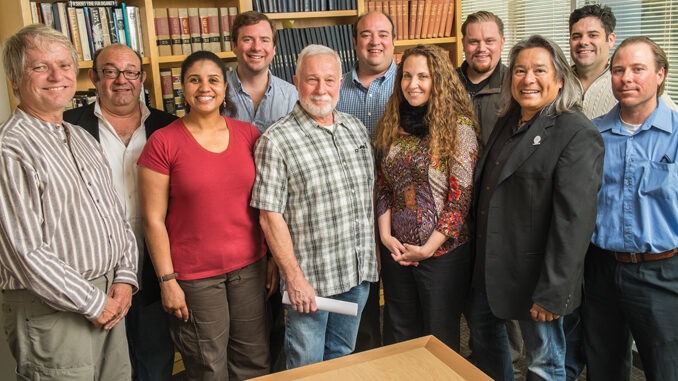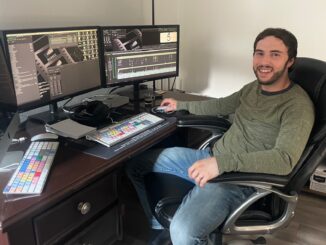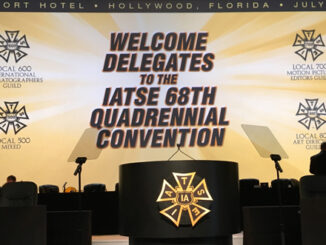
by Stephanie Brown and John Vitale
Let us introduce ourselves: We are the Membership Outreach Committee. The committee was established by the Editors Guild Board of Directors as an avenue through which members can interact with each other to generate and distribute solutions to issues that you, the membership, help identify.
It is staffed and served by various members from different classifications with a mission to increase overall membership participation in our post-production community and to implement innovative tools to better assist members in addressing workplace concerns.
The Membership Outreach Committee helped in the creation of summary booklets and downloadable links for the most current contracts. It is always important for you to know what contract you’re working under. These summaries provide convenient access and less complicated language to better assist in applying your contractual provisions and ensuring that you have a clear understanding of what is rightfully expected under the contracts.
If for any reason you are still in doubt about which contract you are working under or do not understand the application of some term or working condition, call the Guild office and speak with a Field Representative — keeping in mind that such conversations are always kept in strictest confidence. A helpful reminder of some of the more general contract provisions are the “Post-Production Code of Conduct” posters that many of you have already displayed in your editing room. Call the Guild if you’d like a poster sent to you for your workplace.
Another of the committee’s implemented inspiration is the “Coffee and Donuts with the Reps” at the studios. This was meant to maximize the amount of people the reps could visit within a couple of hours. Your Field Representatives enjoy meeting with you and answering any questions you may have; don’t be afraid to get to know them. Most are your peers and came from the rank and file membership. These gatherings also afford you an opportunity to meet fellow members working on the lot. It is a networking advantage not to be missed!
In an effort to provide an environment for union members to connect with each other to exchange ideas and discuss issues that are important and relevant to us, we created a private Facebook page called I AM THE UNION: A Motion Picture Editors Guild Discussion Group at www.facebook.com/groups/iamtheunion/. It currently has over 1,000 members and is growing each day. Many members have already used the Facebook group to engage in spirited discussions about the current film tax credit being considered in the California State Senate.
Our most ambitious project to date is the development of the roundtable series. Last year, we reached out to the membership to start working on identifying workplace issues and trying to formulate effective ways to address them. Based on input from our colleagues, we decided to start with members working in television — an area in which workflow changes quickly and has had more than its share of problems.
The committee knows that working in television has slowly become more and more difficult over the years for a variety of factors. So in order to get a more detailed idea of the working environment and editorial workflow in television, we conducted a survey of West Coast television picture editors and assistants. The results of the survey represented the opinions and professional experience of almost 600 members and confirmed what most of us had already known: Ever-advancing technology is creating more digital footage, which encourages producers to consolidate more workloads and expect more from editors and assistants.
The producers are also generating unreasonable workflow demands by expecting non-picture editorial tasks to be performed by editors and assistants, such as working on music, visual effects and sound effects. Needless to say, this has also caused much confusion in the chain of command. Who exactly is in charge of the editing room? We now have more concise information as to how these changes have affected our members: Lower morale, social friction, quality-of-life changes and reduced productivity.
Once the survey was complete, we felt it imperative to conduct roundtables, broken down by classification, with the various members who responded to the survey, in order to start a more in-depth discussion of the results. Everyone was told in advance that these discussions would focus not so much on contractual or wage issues, but about what members could do to solve the problems identified in the survey — within the bounds of the contract. The complete survey results will be posted in the Members Only area of the Editors Guild website on May 1.
From these roundtable discussions, “The Post Principles” concept was born. We are excited to facilitate the creation and distribution of these principles written by the professionals that know this business best — us, the membership of Local 700! Look for information on the Facebook page and the Members Only area of the website in the near future.
Let us collectively define what is “reasonable.” Let’s create a layer of confidence for each other so that when we stand up for ourselves and say, “Enough is enough,” we can say it with complete assurance and the backing of the most knowledgeable, well- respected post-production professionals.
Some key principles developed so far include establishing a clear understanding of your deal before you start a job (wages, timelines, workload expectations, etc.), opening a line of communication within your crew, and knowing what to do in an uncomfortable situation, just to name a few. This discussion is coming soon to our Facebook page, I AM THE UNION. It is meant to be an ongoing, evolving conceptualization of post-production etiquette and the principles and values we should all work under and bestow upon each other.
We look forward to conducting additional surveys and conducting future roundtable discussions with television and feature music and sound editorial, as well as sound technicians, Foley artists, mixers, story analysts and lab technicians. The goal is to not just identify the problems, but to develop workable ways to mitigate these problems based again upon collaborating with each other.
We are very excited to launch the I AM THE UNION campaign as a reminder to all that the power of our union comes from each individual member. We can build from each other’s strengths, grow from our collective creativity, and remain strong through our commitment to ensure that our contracts are upheld. Though many of us work in either solitary situations or with a small crew, we have access to a large community. Take advantage of this force. Make it known that you have your fellow member’s best interest in mind by not only standing up for yourself, but standing up for the contract.
Please visit the I AM THE UNION Facebook page to get involved and be a part of our membership’s ideas. Comment, agree or disagree; all opinions are valued. Do you have an idea for the Membership Outreach Committee? Please do not hesitate to contact us at outreach@editorsguild.com. We look forward to hearing from you and perhaps assisting you in how to make a difference.





